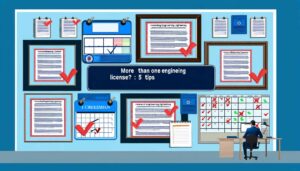Meeting PDH Requirements with Multiple Engineering Licenses
Licensure as an engineer is the mark of a professional. It provides a nationally recognized standard for the public that denotes you are a dedicated, skilled designer. If you hold an engineering license in more than one state, you have to meet all of the requirements that each board sets, including those for continuing education. Complying with the myriad CEU rules and regulations can be confusing, and the penalties for non-compliance may be severe. Understanding the engineering continuing education rules is the key to avoiding sanctions as well as saving a lot of time and effort.
Many registered engineers hold licenses in more than one state, which allows them to work in more than one geographic location. Currently, 42 states require PEs to earn continuing education credits as part of license renewal. Each state has its own set of rules and regulations about the number of PDH hours, pre-approval of courses and providers, ethics training, and the renewal cycle. These varying requirements make complying with engineering education requirements difficult.
We are asked by many of our engineering students how they can comply with all of the state board continuing education requirements. In this article we present our Top 5 Tips for earning all of the credits you need, doing it on time, and having the required pre-approvals. Check out our assessment of this challenge and some practical tips for maintaining multiple PE licenses.
Continuing Education Requirements
It would be great if every engineering board used the same standards for continuing education. Unfortunately, each board came up with its own requirements. If you are registered in multiple states, you need to know what the requirements are in every state where you hold a license. You need to know
- Renewal cycle
- Number of PDH credits required
- Course pre-approval
- Instructor and provider pre-approval
- Special courses like ethics or state engineering laws
- Types of courses that are allowed
Engineering License Renewal Cycle
Each state engineering board determines the renewal cycle for PEs. Most states have a biennial period, which is every two years. Three states have an annual renewal requirement, and New York requires engineers to renew their license every three years.
It is extremely unlikely that the renewal dates of your various licenses will fall on the same date. Even if every license you hold is in a biennial renewal state, you may have to renew in an odd or even numbered year. Many states have everyone renew on the same date, but the dates they have chosen are different. Wisconsin, Indiana, and Vermont all renew on July 31st of even numbered years. Alabama and Maine do it on December 31st of odd numbered years.
State-Specific Renewal Dates for Engineers
Many states want to avoid a crush of renewals and spread them out. Maryland has engineers renew their licenses on the last day of their birth month. Oklahoma uses the last day of the month based on date of initial licensure. Arkansas renews on December 31st of odd years for licenses ending in odd numbers and December 31st of even years for licenses ending in even numbers. Kentucky uses June 30th of odd years for engineers with last names beginning with A – K, and June 30th of even years for engineers with last names beginning with L – Z.
With such a mix and renewal cycles and dates for renewal within the period, you will have to keep track of each license to ensure you don’t miss the date. On top of this, you also have to accumulate enough continuing education credits to satisfy your state Board’s PDH requirements.
Pre-Approval Requirements for Courses and Course Providers
Six states require engineers to complete their continuing education courses from approved providers. The states that pre-approve course providers are:
- Florida
- North Carolina
- New Jersey
- New York
- Maryland
- Indiana
If you are registered in one of these states, you have to take courses from an approved provider. Each state maintains a list of the approved sponsors, so check you State Board’s website before taking a course.
Tip #1 –Most difficult state rules. A simple, yet effective strategy is to use the most restrictive requirement as your guide. For example, if you are registered in two states and only one requires you to use a pre-approved sponsor – consider taking all of your continuing education courses from one of the approved providers. This will satisfy the state that pre-approves CEU providers, and the state that has no requirements should also accept the courses.
How Many Engineering PDH Credits are Required
Keeping track of the number of continuing education hours required for each state can be challenging. Most require you to earn 15 PDH credits each year or 30 hours per biennium. However, several states only require 12 hours on an annual basis – Alaska, New Jersey, and Pennsylvania require 24 hours every two years, and New York requires 36 hours every three years. Virginia has the lowest requirement at 16 credit hours during each two year renewal period.
Tip #2 – Earn the most hours required every year. If you are registered in a state that requires 15 hours every year or 30 every two and another state like New Jersey that only requires 24 hours in the same period, you should earn 15 hours of CEU courses every year. This will give you 30 hours when it comes time to renew, which, in our example, is more than you need in NJ. As a bonus, New Jersey would allow you to roll over the extra 6 hours for the next cycle.
Engineering Ethics Courses
 Currently, 12 states require PEs to complete at least one credit hour of ethics every renewal cycle.
Currently, 12 states require PEs to complete at least one credit hour of ethics every renewal cycle.
- Delaware (3 hours)
- Florida
- Indiana (
- Louisiana
- Maryland
- Minnesota (2 hours)
- Mississippi
- New Jersey (2 hours)
- New Mexico (2 hours)
- New York
- Texas
- Wisconsin (2 hours)
Wisconsin statutes requires the ethics course to cover ethics and professional conduct. Florida and Indiana also require licensees to earn at least 1 hour in State Engineering Laws.
Tip #3 – Take an ethics course every year. Regardless of whether your state board requires PDH credits in ethics, you should take at least one hour in engineering ethics every year. All states accept this topic, and you will earn at least 2 hours every biennial period which should satisfy every state’s requirement.
Continuing Education Tracking Services
There are several services that help you keep track of your continuing education credits. Most have an online repository where you can upload copies of your certificates of completion. The NCEES has a continuing professional competency (CPC) tracking system. This is a free service that allows you to track and report your CPC credits to each state engineering board.
Tip #4 – Use a CPC tracking system.
Tip #5 – Get a NCEES Record
 A great time saver is the NCEES record. Most (though not all) states will accept your NCEES records in lieu of the SERs and exam and license verifications. Some states will also accept things like recommendations with your record, but many still require your sponsors to submit new letters of recommendation with your application.
A great time saver is the NCEES record. Most (though not all) states will accept your NCEES records in lieu of the SERs and exam and license verifications. Some states will also accept things like recommendations with your record, but many still require your sponsors to submit new letters of recommendation with your application.
Number of PE Licensees in the US
The profession of engineering is regulated through licensure by all U.S. states, territories, and the District of Columbia. There are currently more than 820,000 professional engineers (PEs) registered in the United States. This number includes many professionals who hold licenses in more than one state, so the number of individuals in the US who are PEs is lower. No statistics are available for how many engineers are registered in more than one state.
Are You Considering Licensing in Another State
The fundamentals of engineering exam and the discipline PE exams have all been standardized by the NCEES, and every state uses these exams as part of their registration process. If you pass the exam in one state, you can use the results in every other state. This means you only have to take these tests once!
In reality, there is no true reciprocity or comity between one state and another state. Most states allow an individual licensed in another state who also meets their minimum requirements to apply for a license. The Board then decides if they will accept the application or not. One positive arrangement – all states accept the results of the NCEES examinations taken by the applicant in another state.
If you are licensed in another state, you need to submit a complete application to the State Board with the supplemental informant they require. Usually, this is some variation of a supplementary experience records (SERs), references, the application fee, references, and other applicable documents to support the request for licensure.
Recommendations for Multiple State License Holders
If you hold more than one state engineering license, you need to develop a system for managing the continuing education process. The key is knowing and understanding what each state requires. Once you know what’s required, you can create a strategy that minimizes the cost and time required to earn engineering PDH credits while ensuring you meet all of the requirements. Thing to remember:
- Pay attention to renewal dates so you don’t find yourself short credits at the last minute.
- Use approved course providers
- Take at least one ethics course.
- Earn 15 hours of engineering CEU every year (you can roll over any extras).
- Read the rules about continuing education for your states.
